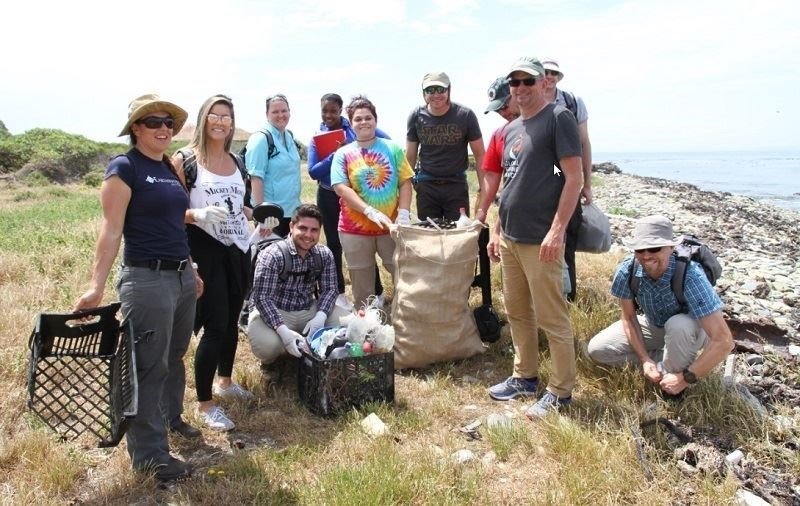A contribution to solving the marine debris problem
Sustainability
January 17, 2018Reading time: 3 minutes
As part of Amcor’s ongoing commitment to sustainability, Earthwatch saw 15 co-workers travel to Cape Town to study the impacts and causes of marine debris. Gerald Rebitzer, Director Sustainability at Amcor Flexibles, reports back.
As part of Amcor’s ongoing commitment to sustainability, Earthwatch saw 15 co-workers travel to Cape Town to study the impacts and causes of marine debris. Gerald Rebitzer, Director Sustainability at Amcor Flexibles, reports back.

It’s been 17 years since we first partnered with Earthwatch, and during that time hundreds of Amcor co-workers have participated in ground breaking research around the world. The programme represents a fantastic learning experience for everyone involved and now also provides valuable data for solving the urgent global challenge of marine debris.
This year’s Earthwatch team participated in a 11-day research trip in Cape Town, focusing on the causes and effects of marine debris in the natural environment.

One piece of a global puzzle
Focusing on a 300km stretch of coastline, the Cape Town project was part of a global study of 20 countries, which is being conducted by CSIRO, the leading global research organisation on marine debris. The study aims to understand the sources, distribution and impact of marine debris, and is the first effort to develop an integrated, global-scale baseline of flows of plastic waste into the ocean.
Led by Dr Denise Hardesty from CSIRO Marine and Atmospheric Research, and under the guidance of Dr Chris Wilcox and TJ Lawson from CSIRO Marine and Atmospheric Research, Amcor co-workers and the Earthwatch team conducted surveys, analysed marine debris, investigated its sources and forms, and looked for ways to prevent plastics entering the ocean.
Working together to cover more than 100 sites, we conducted surveys of debris from the city and surrounding areas, and from creeks and rivers that flow into the ocean. CSIRO’s initial data summary reveals that we analysed and categorised more than 7000 items, and found that while glass fragments contributed most to inland pollution, plastic fragments were also present throughout the region.
So what were the key learnings of Earthwatch 2017 and CSIRO’s research?
A key learning for Amcor – but also for the industry and scientific world in general – is that thanks to the CSIRO research, there are now practical and useful data-collection methods available for mapping the vast majority of plastic flows in the oceans. With these methods, it’s possible to model where the plastics come from and where they end up. What’s interesting is that the preliminary results of the CSIRO research show that the plastic items and fragments don’t actually move too far from their source, or are even being transported back to the sources of pollution. The conclusion here, then, is that plastic items and fragments don’t travel far from their source, which usually isn’t more than 100km.
This is a very welcome discovery because it shows that the causes and effects of plastic pollution on a local level are much more connected than previously thought. With this finding comes the hope that it’ll be much easier to convince local communities and businesses to act to reduce leakage into the environment, and increase recycling and recovery of plastic packaging – measures that will directly benefit their own communities.
From an Amcor standpoint, we’ll be using the Amcor Earthwatch team to further spread this message. The group we sent to Cape Town represented 11 countries and a range of Amcor functions – from frontline production and supply chain to sales and HR. Earthwatch participants will act as ambassadors to help build momentum internally and in the industry overall; we need to spread the word that marine debris is a problem that can be solved on a local level.

Amcor’s sustainability leadership
At Amcor, we’re using our packaging expertise and demonstrated leadership to address this urgent environmental challenge – and we see industry-wide, regional and global collaborations as the best way of doing so.
Partnering with and participating in Earthwatch marine debris expeditions is just one of the ways Amcor demonstrates its commitment to sustainability.
As a member of Ocean Conservancy’s Trash Free Seas Alliance, we’re committed to protecting the world’s oceans from the growing problem of marine debris. And as a core partner in the Ellen MacArthur Foundation’s New Plastics Economy initiative, we’re a key player in a global collaboration that involves rethinking and redesigning the future of plastic packaging.
We’re also working with partners from the complete value chain on developing recycling options for flexible packaging in Europe (CEFLEX) and the US (Materials Recovery for the Future). Both initiatives focus on identifying and implementing viable, practical and economic solutions to keep plastics in the economy and out of the environment.
You can find out more about these ongoing initiatives and collaborations here.
